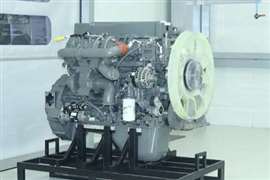Fil Filipov on his acquisition of Atlas
17 May 2010

Former Terex executive Fil Filipov has acquired Atlas loader cranes from his old company. IC talked to him about the deal
The return of Fil Filipov to the crane industry has certainly raised some eyebrows.
Filipov retired from his full time job as Terex Cranes president and CEO at the end of 2003, handing over to son Steve. He has returned by taking over the Atlas knuckle boom crane and the low-volume Atlas heavy excavator product lines from Terex.
A current president at another of the world's biggest crane manufacturers likened Filipov's takeover of Atlas to Michael Schumacher's Formula One motor racing comeback. Such a comment goes some way to showing the reverence in which Filipov's experience and influence is held by his former and new peers.
Comfortably nestled in one of the meeting rooms at Terex's Bauma stand, the man himself makes it quite clear, however, that he is not here to make waves, rather to do business for everyone's benefit.
"Terex has been very good with me," says Filipov, "And I think I have been very good with them because I have taken the whole thing over."
He refers to the Atlas loader crane and heavy excavator lines of the German Atlas company Terex acquired in 2001. Filipov has took them under his wing just before the Bauma exhibition last month with a new organisation called Atlas Maschinen GmbH in which he has a 100% holding. At Terex this part of Atlas made a significant loss in the 2009 financial year.
Strengths
Arguably then, even for a seasoned expert like Filipov, who owns numerous companies around Europe, the job of turning Atlas around seems like a tough one.
The answer, he says, is to play to its strengths. "I am not like the big companies that will spend a lot of money. The new strategy will be special adaptations, more centred at the niche market. This includes wide tracks, narrow tracks, amphibian tracks, higher cabs, special grapples, extendable telescopic booms, remote controls, electric machines - all of those are the things that most people do not want to do."
Success will be achieved through restructuring and simplifying the organisation, explains Filipov, as well as by reducing lead times.
"It is going to be a German company and it is not going to integrate into any other companies or holdings - I am going to be the only shareholder." Streamlining the company in this way, says Filipov, will free up some of the workforce to concentrate on the product itself.
"I will separate the organisation into separate departments and make sure the core products are time sensitive to so we don't have to wait months for a crane. There are going to be suppliers that will not want to introduce these costs and lead times, so I may have to integrate some of these [components] back in."
The fact that Terex transferred a certain amount of capital to Filipov with the business will help matters. "Some cash injection hit the balance sheet. Let's put it this way, there is no bank debt and the balance sheet is positive," explains Filipov. "There are more assets than liability, although I've taken pension liabilities in Germany - but I would prefer that to bank debt. The company has been losing a lot of money, and is still losing money. It is projected to lose money through 2010, lose less in 2011 and be profitable in 2012 or earlier."
Way ahead
"Terex was a US$2 billion company when I left. By 2007 it was a $10 billion company. It was a big company and when you have a big company you don't do the same things."
The way forward is particularly uncertain because of the economic situation. "Atlas was probably profitable two or three years ago with volume but those volumes will not return," comments Filipov. "Waves carry all boats at the same time, and for five years the whole industry was hyped for growth, so everybody was caught out at the end of 2008. It has thrown a lot of people off balance."
While Filipov seems certain about the success of his new venture, he does not plan to be a hands-on chairman throughout his ownership. "I am going to be hands on until it runs. I have a business in Holland that I visit once a year. I am very good at bad times, but if times are good I don't need to be there."






